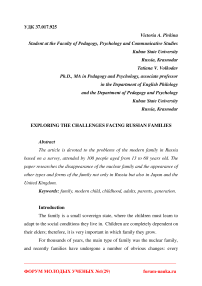Exploring the challenges facing Russian families
Автор: Pivkina V.A., Volkodav T.V.
Журнал: Форум молодых ученых @forum-nauka
Статья в выпуске: 1-1 (29), 2019 года.
Бесплатный доступ
The article is devoted to the problems of the modern family in Russia based on a survey, attended by 100 people aged from 13 to 68 years old. The paper researches the disappearance of the nuclear family and the appearance of other types and forms of the family not only in Russia but also in Japan and the United Kingdom.
Family, modern child, childhood, adults, parents, generation
Короткий адрес: https://sciup.org/140284600
IDR: 140284600 | УДК: 37.017.925
Текст научной статьи Exploring the challenges facing Russian families
The family is a small sovereign state, where the children must learn to adapt to the social conditions they live in. Children are completely dependent on their elders; therefore, it is very important in which family they grow.
For thousands of years, the main type of family was the nuclear family, and recently families have undergone a number of obvious changes: every member of the family of a post-industrial society has the right to manage their lives as he or she sees. Society should be as tolerant as possible and should not interfere in one’s life; gender roles are blurred [1]. American researcher Blackwell claims that divorce, remarriage, raising children out of wedlock and many other changes led to the formation of many types of families: single mothers or fathers, grandparents raising grandchildren, - the list is endless [2].
In Japan, for instance, the family institution also undergoes drastic changes. Thus, Japanese girls are getting married later in life. They prefer to build a career, not a family. Furthermore, women are inclined to take part in the public and political life of the country. Recent research has shown that Japanese men refuse to take up the initiative to create a family and are susceptible to infantilism even at the age of 30-40. Today young people avoid any close relationships [1].
The results of the study by Hoff confirmed that two thirds of British women work and spend less time with their children. Men, on the contrary, tend to devote more time to their children. Parenthood in the UK is increasingly separated from marriage, because divorce (including in old age) has become more acceptable than in the past. Moreover, there is an increase in life expectancy and a decrease in the birth rate (childlessness is growing). The interaction between generations is increasingly disturbed by geographic distance [3].
The family transformations affect the psychological well-being of children. According to the American researcher Postman, childhood obesity is on the rise in all OECD member countries, which leads to many potential physical, social and psychological problems of children [4]. American psychologists conclude that modern children have a higher level of stress and sleep less compared to children of the past generations [5].
Materials and Methods
To identify the problems modern families are facing, we interviewed 100 people from Russia aged from 13 to 68 years old (Table 1). An online survey was completely anonymous.
Table1. Questionnaire "The Problems of Russian Families"
|
Questions |
Possible answer |
|
1. What is the composition of your family? |
|
|
2. Are there any problems for the children in your family? If so, which ones? |
|
Results and conclusions
The results of the survey showed that 59% of the Russian families are nuclear (i.e., include father, mother and children). The remaining 41% of the families belong to other types of families: divorced parents and children (15%); parent who remarried with children from the previous marriage (11%); single father, mother and children (5%); grandmother, grandfather and grandchildren (4%); other family members (6%).
According to the results obtained 53% of the families reported that the children have no problems. In the remaining 47% of the families, children suffer from such problems as high level of stress (23%), lack of sleep (19%) and computer addiction (15%). In nuclear families, 63% of the respondents stated that the children have no problems.
The results of the survey confirmed that the condition of the child depends on the family. Moreover, children feel most comfortable in the nucleus family.
The most common problem of children in the family is a high level of stress. It is noteworthy that among the Russian families, the nuclear type of the family prevails.
Список литературы Exploring the challenges facing Russian families
- Hripsime D. The Challenges of the Family as a 21st Century Social Institution: Part1.- Armenia: SPA «Enlight Studies». - 2016. - Retrieved from URL: https://enlightngo.org/language/en/post/940
- Blackwell A. Families of the 21st Century. - USA: online Self Improvement Community. - 2009.- Retrieved from URL: https://www.selfgrowth.com/articles/Families_of_the_21st_Century.html
- Hoff A.S. Current and future challenges of family care in the UK. - Zittau: Goerlitz University of Applied Sciences. - 2015. - C7-42
- Postman N. The Disappearance of Childhood / N. Postman. - New York: Vintage Books, a division of Random House. - 1994. - C4-26
- Harris A. Engaging Parents in Raising Achievement. Do Parents Know They Matter? / Harris A., Goodall J. Boston: University of Warwick, 2007.- C. 2-142


